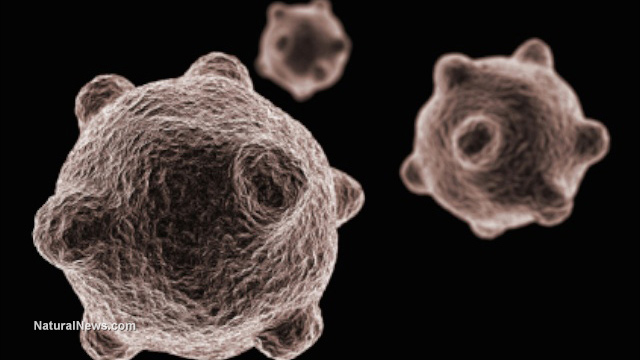The end of the age of antibiotics and the rise of the superbugs
Wednesday, July 16, 2014 by: Tony Isaacs
Tags: antibiotics, superbugs, drug-resistant infections

- TAKE IT DOWN Act advances in Congress amid free speech concerns
- Survival 101: Dangerous places to avoid when disaster strikes
- Hospital staffers sound alarm after 10 nurses were diagnosed with BRAIN TUMORS
- “Prepare Tribe: Prepare, Protect, Provide” on BrightU: How to build a disaster-proof shelter in the middle of nowhere
- New studies ignite debate: Fluoride linked to autism and ADHD, prompting calls for policy reassessment
- DOJ and ATF kill Biden’s “Zero Tolerance” firearms dealer policy
- Sen. Ron Johnson accuses CDC official in charge of COVID-19 injections of deleting records amid Congressional GOP scrutiny
- Barley: A nutrient-dense ancient grain with modern benefits
- Sovereign debt paradox: U.S.-China mutual holdings fuel geopolitical tensions
- Federal appeals court authorizes DOGE access to Education, Treasury and OPM records
- Children’s Health Defense stands firm: Based on SCIENCE and personal experiences, the MMR vaccine is NEITHER SAFE nor EFFECTIVE
- Analysis: The coming economic collapse, a mass uprising and Trump's three secret weapons to halt the growing revolt
- Fauci is back in the limelight, and he’s busy promoting a future COVID or FLU pandemic
- Widespread social and economic unrest: Steve Quayle issues urgent financial warning of imminent asset collapse in new interview with Mike Adams
- Aerosolized bioweapons? Strange “diploid biomasses” falling out of the sky in Florida captured under the microscope
- Mike Adams releases country western hit single: Goin’ Back in Time is Comin’ Home
- Tulsi Gabbard leads charge against the Biden regime’s global censorship of the 'Disinformation Dozen'
- Israeli lobbyists boast of controlling US national security policy in leaked AIPAC audio
- Fauci is back in the limelight, and he’s busy promoting a future COVID or FLU pandemic
- Tulsi Gabbard leads charge against the Biden regime’s global censorship of the 'Disinformation Dozen'
- Aerosolized bioweapons? Strange “diploid biomasses” falling out of the sky in Florida captured under the microscope
- Analysis: The coming economic collapse, a mass uprising and Trump's three secret weapons to halt the growing revolt
- Kiss Your Genetic Privacy Good-Bye! 23andMe Gets Green Light to Sell Your Intimate Genetic Details to Anyone They Want
- Widespread social and economic unrest: Steve Quayle issues urgent financial warning of imminent asset collapse in new interview with Mike Adams
- U.S. lawmakers investigate Meta over alleged China collaboration
- Mike Adams releases country western hit single: Goin’ Back in Time is Comin’ Home
- Chemtrails unveiled: How the CIA and Big Business are manipulating the weather for profit
- Curcumin’s ancient healing power supercharges muscle recovery, and its effects are compounded with anti-inflammatory foods and supplements
- Tulsi Gabbard takes aim at censorship: Justice for the ‘Disinformation Dozen’
- China’s counter-tariff strategies: A new chapter in the U.S.-China trade war
- CLOT SHOT PLANDEMIC UNFOLDING: Fibrous, rubbery clots caused by covid injections have prion-like seeding activity
- Israeli lobbyists boast of controlling US national security policy in leaked AIPAC audio
- European Court of Justice: Healthcare professionals who promoted or administered COVID-19 vaccines are CRIMINALLY LIABLE for any harm caused
- Defunding DEADLY mRNA jabs: Government funding for mRNA technology being scrutinized and sidelined until proven "safe and effective" for real
- DEATH by VACCINE or face PRISON time: Canadian Freedom Convoy leaders CONVICTED for protesting forced vaccination during the Covid Plandemic
- U.S. approves new Russian ambassador as diplomatic thaw continues
- Newly released JFK files reveal Pentagon's role in creating Lyme disease and covid in the same lab
- Analysis: The coming economic collapse, a mass uprising and Trump's three secret weapons to halt the growing revolt
- Mike Adams releases country western hit single: Goin’ Back in Time is Comin’ Home
- Aerosolized bioweapons? Strange “diploid biomasses” falling out of the sky in Florida captured under the microscope
- Kiss Your Genetic Privacy Good-Bye! 23andMe Gets Green Light to Sell Your Intimate Genetic Details to Anyone They Want
- European Court of Justice: Healthcare professionals who promoted or administered COVID-19 vaccines are CRIMINALLY LIABLE for any harm caused
- Federal employees whine over DOGE's new directive requiring them to do a 5-point summary of weekly accomplishments
- Dr. Mike Yeadon releases 15-minute testimony - WATCH - about genocidal intent of COVID “vaccines”
- The Health Ranger releases “Vaccine Zombie” song and music video, using AI-animated zombies for the music video
- U.S. approves new Russian ambassador as diplomatic thaw continues
- Government waste exposed: Hegseth supports Musk’s demand for accountability from federal workers
- Trump reverses course on Gaza plan, says “nobody is expelling Palestinians”
- Now you can HEAR chemistry: Health Ranger translates molecules into music in stunning video demonstration that will blow your mind (and your ears)
- 5 Simple steps to boost your brainpower: How to strengthen executive function in a distracted world
- EPA advisor admits the agency is funneling billions to climate groups ahead of Trump’s return to White House
- A lack of integrity in Academia: Harvard professor found GUILTY of fraudulent research to promote CRT theory
- Rep. Nancy Mace introduces bill to ban biological males from female facilities on federal property
- Survival 101: Effective EMF blocking techniques
- Red Cross issues warning to stop blood plasma donations from vaccinated people
- Scientists confirm: GENIUS brain function can be spontaneously unleashed in humans without any apparent cause
- EPA advisor admits the agency is funneling billions to climate groups ahead of Trump’s return to White House
- HYSSOP: What research reveals about the health benefits of this ancient holy herb
- Two containers with completed ballots fall out of truck in Florida
- Newly released JFK files reveal Pentagon's role in creating Lyme disease and covid in the same lab
- Global leaders unite to clamp down on “misinformation” with UN-backed Cascais Declaration
- BREAKING: 2025 NDAA authorizes mandatory military draft of WOMEN across America… as Pentagon pursues global NUCLEAR war with both Russia and China at the same time
- Michael Yon warns of a ZIONIST TAKEOVER in Trump’s second administration
- Mike Adams releases country western hit single: Goin’ Back in Time is Comin’ Home
- Ozempic and Wegovy weight loss drugs are injectable LIZARD VENOM PEPTIDES that may unleash a devastating wave of organ failure… side effects align with symptoms of SNAKE BITES
- The Health Ranger releases “Vaccine Zombie” song and music video, using AI-animated zombies for the music video
- BOMBSHELL: DNA testing kits are a SCAM to develop ethnic-specific bioweapons
- Israeli soldiers accused of even more torture and abuse in the West Bank
- These 13 countries just signed an agreement to engineer a global FAMINE by destroying food supply
- NASA admits that climate change occurs because of changes in Earth’s solar orbit, and NOT because of SUVs and fossil fuels
- RFK Jr. clears key hurdle: Sen. Susan Collins backs controversial HHS nominee, signaling a new era for health policy
- Sermon 30: How Jesus reveals Caesar’s FAKE CURRENCY and FALSE AUTHORITY
Quite simply, the age of antibiotics is coming to an end, and we have entered the age of the superbugs -- increasingly virulent pathogens which continue to mutate and defeat the strongest antibiotics that science can produce.
Looking back, it is easy to see why modern medicine is losing the war against microbes. Microbes have been around for 3.5 billion years, and it takes many bacteria only 20-30 minutes to replicate.
As Dr. Mark Sircus told Natural News readers in 2008:
"Eventually antibiotics are going to be seen as one of the worst things to ever come out of pharmaceutical science because in the end, they have made us only weaker in the face of ever increasingly strong super bugs that are resistant to all the antibiotics doctors have at their disposal."
Deadly new pathogen outbreaks are turning our hospitals into deathtraps
This year, federal health officials reported that at least 2 million Americans fall ill from antibiotic-resistant bacteria every year and that at least 23,000 die from those infections.One of the widest spread and best known drug-resistant bacterium is methicillin-resistant Staphylococcus aureus (MRSA), which is one of the most common hospital-acquired infections. During the past four decades, MRSA has evolved into an increasingly serious public health threat, as new hard-to-treat -- and often deadly -- strains have emerged.
Drug-resistant bacteria are found lurking throughout hospitals: on equipment passed from one room to the next, on door handles, in sink drains, on the hands of hospital staff and in ventilation equipment and tubes. Carbapenemase-producing Klebsiella pneumoniae, or KPC, is a particularly dangerous bug which has been found in hospitals in at least 44 states so far -- and no combination of antibiotics has been able to conquer KPC.
Last year saw an outbreak in northeast Illinois of the very dangerous bacteria called carbapenem-resistant Enterobacteriaceae, or CRE. CRE is part of a family of more than 70 bacteria, including E. coli, that normally live in the digestive system. The most common infection that the bacteria cause is a urinary tract infection, and if that infection goes to the bloodstream, the patient has a 40 to 50 percent chance of dying.
In December 2013, the CDC reported an outbreak of multidrug-resistant Salmonella Heidelberg in 23 states which was linked to meat from Foster Farms.
Tuberculosis is making a strong comeback and is now termed multi-drug-resistant tuberculosis, or MDR-TB. The World Health Organization (WHO) recorded almost 9 million cases of tuberculosis worldwide in 2011. Of those, almost 1.5 million died. An even worse version of resistant tuberculosis is XDR-TB (extensively drug-resistant tuberculosis), which infects close to 10 percent of the population affected by resistant tuberculosis.
Another old bacterial nemesis making an alarming comeback is Clostridium difficile (C. difficile), which has become increasingly deadly, and its incidence has increased anywhere from double to quadruple in hospitals and homes across North America and Europe. Its primary cause is antibiotic drugs wiping out bacteria that compete with C. difficile.
Nature has the answers to super bugs
The first line of defense against superbugs is a strong natural immune system. When such infections do occur, nature has powerful solutions, such as one or more of the following natural pathogen destroyers:- Colloidal Silver
- Oil of Wild Oregano
- Olive Leaf Extract
- Goldenseal
Sources include:
http://chicago.cbslocal.com
http://www.cdc.gov
http://cid.oxfordjournals.org
http://www.ncbi.nlm.nih.gov
http://www.bastyr.edu
http://www.nytimes.com
http://www.naturalnews.com
http://tv.naturalnews.com
http://www.niaid.nih.gov
http://www.naturalnews.com
http://www.pbs.org
About the author:
"See more articles by Tony Isaacs"
Tony Isaacs, is a natural health author, advocate and researcher who hosts The Best Years in Life website for those who wish to avoid prescription drugs and mainstream managed illness and live longer, healthier and happier lives naturally. Mr. Isaacs is the author of books and articles about natural health, longevity and beating cancer including "Cancer's Natural Enemy" and is working on a major book project due to be published later this year.
Mr. Isaacs also hosts the Yahoo Oleandersoup group of over 3000 members and the The Best Years in Life Radio Show" on BlogTalk Radio.
Antibiotics at FETCH.news
Get independent news alerts on natural cures, food lab tests, cannabis medicine, science, robotics, drones, privacy and more.
Take Action: Support Natural News by linking to this article from your website
Permalink to this article:
Embed article link: (copy HTML code below):
Reprinting this article:
Non-commercial use OK, cite NaturalNews.com with clickable link.
Follow Natural News on Facebook, Twitter, Google Plus, and Pinterest
Science News & Studies
Medicine News and Information
Food News & Studies
Health News & Studies
Herbs News & Information
Pollution News & Studies
Cancer News & Studies
Climate News & Studies
Survival News & Information
Gear News & Information
News covering technology, stocks, hackers, and more



"Big Tech and mainstream media are constantly trying to silence the independent voices that dare to bring you the truth about toxic food ingredients, dangerous medications and the failed, fraudulent science of the profit-driven medical establishment.
Email is one of the best ways to make sure you stay informed, without the censorship of the tech giants (Google, Apple, Facebook, Twitter, YouTube, etc.). Stay informed and you'll even likely learn information that may help save your own life."
–The Health Ranger, Mike Adams












































